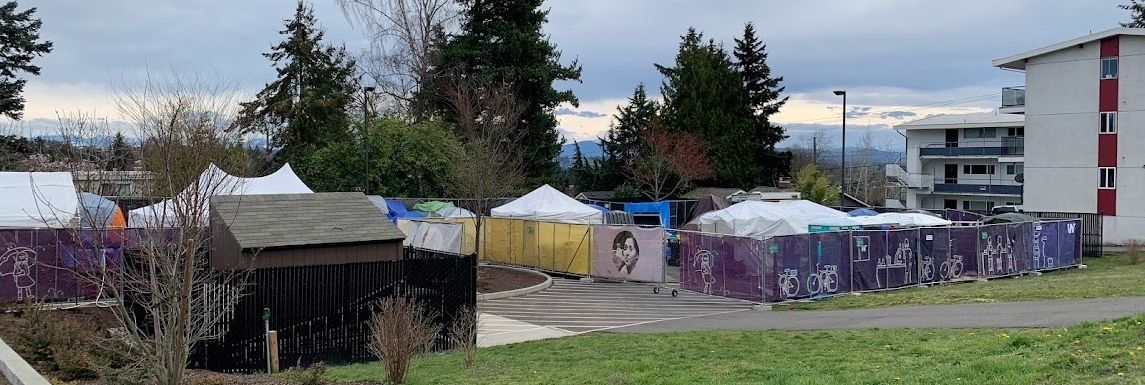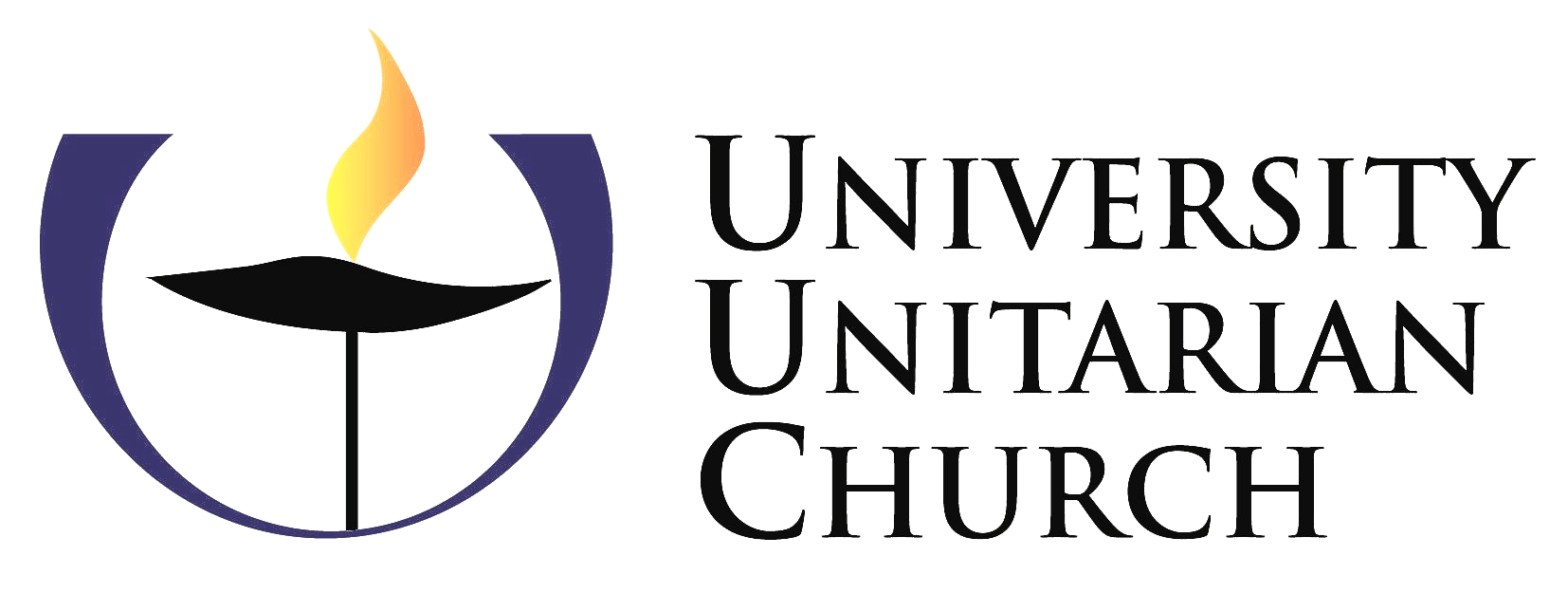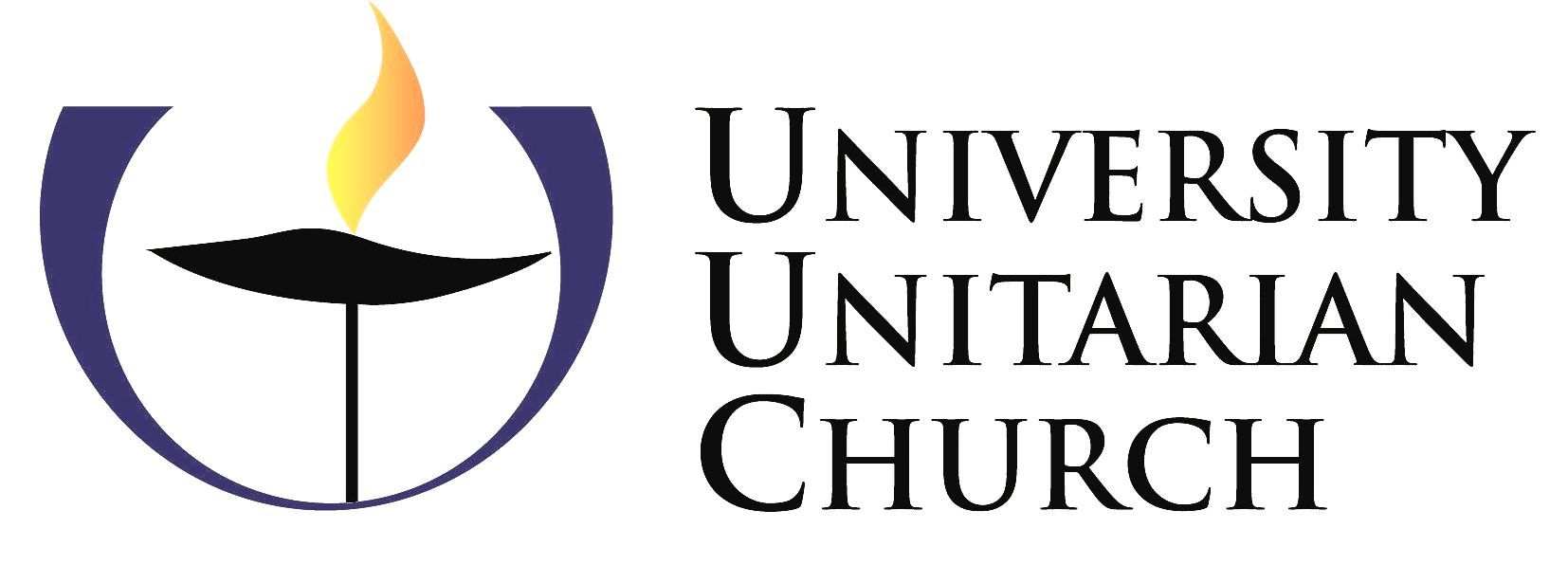A summary and review of our hosting of Tent City 3 this spring/summer
UUC recently hosted Tent City 3 (TC3) for the second time, from March 22–July 26, 2025. Previously we had hosted TC3 for three months in 2023 (March-May). Prior to hosting TC3 again this year, we reviewed the 2023 experience. Drawing upon feedback from our most proximate neighbors and from UUC congregants, a clear decision was made to host TC3 again.
Leading up to our hosting of TC3 this year, it was evident that the landscape around homelessness has changed markedly since 2023. By all indications, the supply of shelter space has grown even tighter, spiking the demand for space in a sanctioned tent encampment. Before, during and after our hosting experience this year, almost 200 individuals resided in the two Tent City camps, 3 and 4. TC3 was the only sanctioned camp in Seattle in 2023, and about 65 residents stayed at TC3 while at UUC that spring. Thus, the Tent City population has tripled from 2023 to 2025. Click here for a recent Seattle Times article about recent trends in homelessness.
Reflecting the growing shortage of shelter space, TC3 was occupied by a greater number of families with kids this year. Most of these families remained at the camp for a much longer period of time than was the case in 2023, when families commonly would find shelter or other housing more readily. Racially and ethnically, our TC3 camp this year was more diverse than in 2023.
Positives
Reflecting on our TC3 experience this year, many positives emerged. These align with our UUC values and our hopes for our relationship with Tent City 3:
- The availability of safe space for almost 100 people over the course of TC3’s time in our parking lot. The primary objective of Share/Wheel, the organization that sponsors TC3, is to enable people to experience safety and community in what would otherwise be a dangerous living condition.
- The relationship of our church to the TC3 camp. Under the strong and enduring leadership of Allie Harris, many UUC members and friends supported our Wednesday evening meals for TC3 residents. This support came in the form of offsite meal prep and onsite set-up, serving and clean-up. TC3 residents consistently expressed their gratitude for the delicious, nutritious food and for the rare opportunity to share a meal indoors.
- Similarly, a foot care clinic offered by a UW health sciences group was made available over multiple sessions. David Kendall provided the UUC coordination of this well-received program.
- Many of us at UUC helped the camp through donations of food, clothing and other items. And several UUC folks helped with the TC3 moves to and from UUC. Again, TC3 folks expressed gratitude for our support and allyship.
- In April, an evening session around homelessness was held at UUC. A UUC friend, Rex Hohlbein from Facing Homelessness, joined us for a discussion around housing, homelessness and how we can relate to and support our unhoused neighbors. The session featured a panel of TC3 residents who poignantly revealed their hopes, dreams and challenges. In addition to UUC attendees, many members of other area congregations joined this program.
- Throughout the TC3 stay in our parking lot, Mary Mason provided strong and steady leadership in working with our Share/TC3 point of contact and Cynthia Setel to address open issues. Mary and Cynthia demonstrated care, compassion and candor in addressing issues that arose (more about this in the next section).
Concerns
There were issues and concerns that arose for the camp, neighborhood and for UUC, including:
- Unlike 2023, this year’s camp featured a number of issues that became difficult to resolve, even with multiple attempts to do so in some cases. These issues were varied, including unrestrained dogs at the camp, overloading of the electrical circuit, loitering and litter in the neighborhood, reports of noise, and limited reports of fentanyl use near the camp. Neighbors have suggested that those issues outside of borders of the camp, such as the litter, loitering and fentanyl, may not have been produced by the TC3 residents themselves. The perception, however, is that these issues largely did not exist before TC3’s time at UUC and have subsided following the departure of TC3. Some have suggested that the issues may have been created by individuals who were either expelled by TC3 or failed to meet the criteria for admission to the camp.
- Our Share/Wheel contact person has acknowledged the ongoing issues and apologized for UUC’s and our neighbors’ experience with them. The persistence of the issues within TC3’s control seems to have been caused, at least in part, by the inability of the camp to effectively and appropriately apply its democratic leadership process. Another factor may have been the aforementioned growth and churn in the Tent City population and the resulting stress on the organization.
- Adding to the challenge was the inability/unwillingness of the north district Seattle Police Department staff to help address the issue of barred TC3 residents refusing to leave the camp or the neighborhood. By contrast, in 2023 the police were very responsive and helpful in addressing these types of cases.
- In addition to receiving a limited number of neighbors’ complaints during TC3’s stay at UUC (and some supportive comments), we invited almost 200 of our closest neighbors to provide input after the departure of TC3. About 5% responded, with eight expressing the concerns listed above and two strongly supporting our hosting of TC3.
- There was additional expense associated with hosting TC3, primarily in the form of an insurance rider. The insurance rider was deemed valuable in order to ensure appropriate liability protection.
Where do we go from here?
First, it’s important that we take time to reflect on what this experience has meant to us, to those at the TC3 camp, and to our neighborhood and community at large. We decided to host Tent City 3 again because of our community’s housing & homelessness crisis and because we felt called to do so from our vision, values and principles.
At the same time, the experience was more challenging than in 2023—for camp residents, our neighborhood, and our church. Over time, it will be important that we also weigh and reflect on this part of our 2025 TC3 hosting.
In the near term, we will continue to focus on other key efforts/relationships within Homelessness Ministries work, including Teen Feed, Lake City Partners, and public policy advocacy around housing and homelessness. And we will continue to identify other ways for our church community to be engaged with this critical area of need in our community. Along these lines, don’t miss the upcoming opportunity on October 7 at UUC featuring Dr. Gregg Colburn, UW professor and author of Homelessness is a Housing Problem. Click here to register to join others at UUC and in our broader community, and to learn more and discuss how to address housing and homelessness.
Related to this, we will explore additional options for using our church space as part of UUC’s Faith Land Initiative process. If you have ideas about how we might apply our physical property to help address housing, homelessness or related community needs, we invite you to contact one of the Faith Land Initiative core team members listed below.
Thank you for your support of UUC’s Homelessness Ministries work and for your commitment to a more just and equitable community.
~Dave Mentz, UUC Tent City 3 Team
Faith Land Initiative core team members:
Patricia Graesser (patsygraesser@comcast.net)
Gayle Childers (gayledchilders@comcast.net)
Dave Mentz (davementz@msn.com)
UUC Tent City 3 (2025) team members:
Debbie Maranville
Cynthia Salzman
Laurie Mann
Pam Smith Mentz
Walter Hatch
Sallie Dacey
Mary Mason
David Kendall
Dave Mentz

Posted/updated on:

